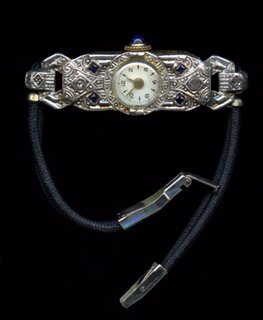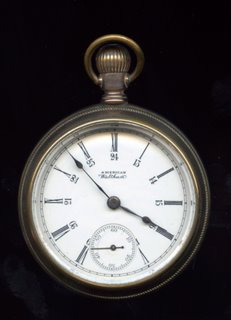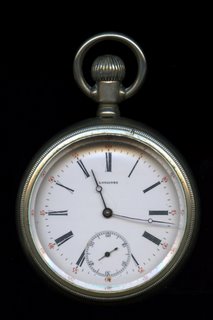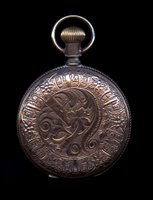1869
The Personal History And
Experience Of
David Copperfield The Younger
Chapter 1
I am Born
Whether I shall turn out to be the hero of my own life, or whether
that station will be held by anybody else, these pages must show.
To begin my life with the beginning of my life, I record that I was
born (as I have been informed and believe) on a Friday, at twelve
o'clock at night. It was remarked that the clock began to strike,
and I began to cry, simultaneously.
Charles Dickens
Time has been on my mind of late and in particular my abhorrence for linear time. We moved to our present home in 1986 and our bed is exactly where it was then. I remember our first night after I placed our recently purchased French antique clock on the fireplace mantle of the den (then called the smoking room as I smoked pipes there). I could hear the clock striking the hour (I forget but it was late) and bent my head back to look out of the window. I remember telling Rosemary that I could not believe that we had moved to such a beautiful house. It was quiet and no long-haired neighbours would suddenly rush in next door (as they had so often done in our old strata title home in Burnaby) with cartons of beer and sing along to Creedence Clearwater Revival into the wee hours of the morning.
Time has passed, 23 years. But I still turn my head and look out of the window and marvel at it all.

It was yesterday that Rosemary made an astonishing statement in my direction. “You are not long for this world. You live in the past. You tell me what your mother (her watch given to her by my father, right) would have done. Everything was perfect then. It is all wanting now. You are most unhappy now. There is no sense for you to go on in such a state.” I was left speechless. I thought about it quietly. I thought about the past and about time.
It was around 1984 that I wanted to begin to write when I received a most important piece of advice from my friend and writer Les Wiseman. He told me, “You never begin a story from the beginning. You start somewhere in the middle and then work yourself both ways." This has served me well as it seems that most people wanting to tell a story and put it on paper invariably begin at the beginning. Time for them, as it is for most of us, is linear.
Without wishing to tell Rosemary that she is entirely wrong about my scrutiny into my past, I would like to clarify if not correct that my concern is a constant back and forth assessment on how the past put me into the present and how a backward glance might just reveal a forward path.
I do believe that as a human I like to maintain a sense of order. I want to know where things came from and where they are going. If I had a friend who disappeared in my past and almost in my memory I would like to pin my friend down, analyze why we are no longer friends (distance, physical separation). I try to locate my erstwhile friend, renew the friendship if possible or at the very least be able to neatly close the drawer.
It was sometime around 1988 when I went to Buenos Aires for the first time since I had left in 1966 after finishing a two year stint as a conscript in the Argentine Navy. I rang the bell at the home of Susy, an ex-girlfriend I had last seen in 1966 (was madly in love with her) and managed to survive her instruction, "Alex aren't you going to kiss me?" When she died of cancer a few years back I closed her drawer even though memories persist and are there to call back on demand.

Going to my St. Ed's High School reunion this June will put me into the same mode of looking back and pushing forward at the same time. I will study the bond my classmates shared for those four years we boarded in the great neo-Gothic building. Perhaps I will not have anything in common with the dentist, the lawyers, the funeral director, the adobe brick factory owner, the rice farmer, the bean counter who denies ever to have worked for the CIA, the contractor who profits from Texas coast hurricanes, the cowboy rancher who raises quarter horses, the NASA physicist, the PHD in nuclear energy, and the memory of my friend who in a Catholic school had the audacity to proclaim his belief in no God.
If nothing arises from the reunion I will at least be able to again enjoy when I chat with my ex-religion and saxophone teacher, Brother Edwin Reggio, CSC, the unlikely occurrence that back in 1959 I would have never considered (had I looked into the future as my Rosemary suggests I do more often) that some day he, Brother Edwin, and my 10-year-old granddaughter Rebecca would sit next to each other and bite into a huge plate of Texas barbecue.
Time plays a curious game when we temporarily lose our sense of linearity. I had first learned about Einsteinian time in 1963 when my physics professor Chicurel told us the story of the two trains going in the same direction. In 1964 in my train leaving from the Retiro station in downtown Buenos Aires, I happened to glance out of the window and noticed that another train was leaving in the same direction. For a while it looked like both trains were not moving even though I could feel the vibration under my feet and hear the clickety-clack of the wheels. Then the other train accelerated and it seemed we were going backwards. I was amused as I considered that time was not what it seemed.

Since I was lucky enough to not be assigned to an Argentine naval base (the Argentine Navy prized my ability to translate English into Spanish) it meant that I had to pay for my lodgings in the Beccar (a suburb of Buenos Aires) home of a retired Nazi officer. The food was good, the price was right and I kept to myself. Knowing I needed funds one of my sailor mates, Victor Corrales (standing behind me in the photo above, asked me if I were willing to work with him as a waiter weekends in a cantina (bar that served food and had musical entertainment) in the legendary area of Buenos Aires, La Boca. The joint was called Paquebot Priano. The picture shows three of my Argentine Navy sailor mates, all dressed in black and three US Marines who worked with us at the Senior US Naval Advisory Group. It was after working until the wee hours of the morning that I would ride the train back to Beccar. One day, I will never forget, I fell asleep on the bed I was so tired. When I woke up it was late afternoon of the next day. It was six o'clock. I felt a bit tired but ultimately after a coffee I was refreshed. It all vanished when I noticed that the light was acting strangely. It was getting lighter not darker. That's when I knew it was six o'clock in the morning and that I had only slept at the most two hours.
Time (its ravages) is most evident when I go into my photo files and noticing how some of my photographs are stained (bad fixing and time accelerates the staining) or how I must labour at getting the colour right when I scan old colour negatives. But time seems strange when Rosemary and I file old family photographs, "Alex they will appreciate it when we are gone."
What that really means, and I will not mention it at all to Rosemary, is that we will be helping our daughters and granddaughters to explore their past, our past and what remains of our future.
The Magical Filipino Timex

Marking Time
Astern there was a closed door that he had never breached. From that place now came, very loud, a ticking, multiple and unsynchronized...After much hesitation, he made up his mind. He used the butt of his musket, broke the lock and entered...Clocks. Water clocks, sand clocks, solar clocks propped against the walls, but especially mechanical clocks arrayed on various shelves and chests, clocks moved by the slow descent of weights and counterweights, by wheels that bit into other wheels....
It may seem incredible - to you who read this with detachment - but imagine a castaway, amid the fumes of aqua vitae, on an unhabited vessel, finding a hundred clocks almost all in unison telling the tale of his interminable time; he must think of the tale before thinking of its author. And this is what Roberto did as he examined those toys one by one....The clocks were functioning, thus someone must have set them in motion, even if their winding had been designed to last a long time. And if they had been wound before his arrival, he would have heard them already, passing by that door.
...On the ship an intruder did exist.
He had entered the room and had wound the mechanisms. Why he had done so was the first but less urgent question. The second was where had he then taken refuge.
From "The Island of the Day Before", Umberto Eco, 1994







